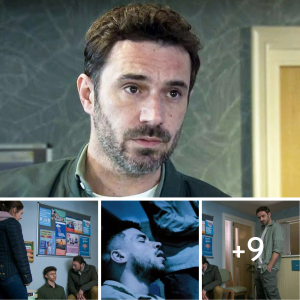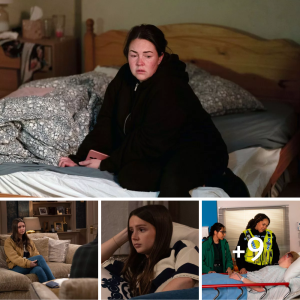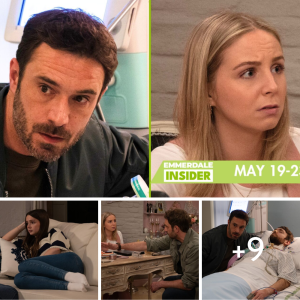Emmerdale is bracing for a deeply emotional and potentially life-altering storyline centered around the young but resilient Sarah Sugden. Beneath a veneer of outward normalcy, a quiet fear has been simmering within Sarah, and next week, that hidden turmoil threatens to erupt into a crisis that could leave the entire Sugden-Dingle clan reeling. Having already weathered more adversity than most adults – a heart transplant, a battle with cancer, and the ever-present shadow of a genetic condition – Sarah is now facing a new and intensely personal struggle, one that intertwines a bold desire for motherhood with a terrifying resurgence of her past health battles.
At just 19 years old, Sarah makes a courageous and somewhat unexpected decision: she wants to become a mother. In a move that speaks volumes about her independent spirit and yearning for a different kind of fulfillment, Sarah envisions a future where she navigates motherhood alone, free from the complexities and heartaches of romantic relationships. This isn’t a fleeting whim; it’s a deeply considered desire, a dream that has taken root and refuses to be shaken.
However, as Sarah bravely pursues this dream of creating her own family, a dark cloud begins to gather. A pivotal visit to a fertility clinic, a significant step in her motherhood plan, leaves her not with hope, but with a chilling wave of fear and uncertainty. Something deeply concerning is uncovered during this appointment, something that sends Sarah into a spiral of silent panic. The crucial question that hangs in the air: what exactly transpired at the clinic that has left Sarah so profoundly shaken? And, perhaps more poignantly, why is she choosing to bear this heavy burden in complete secrecy, isolating herself from the very people who love and support her the most?
Sarah’s decision to embark on single motherhood isn’t born out of impulsivity. It’s a decision forged in the crucible of her young life’s experiences. After navigating a landscape littered with relationship dramas and enough emotional upheaval to last a lifetime, Sarah has reached a point of resolute clarity. The traditional path of romance and partnership no longer holds appeal; she seeks solace and purpose in the idea of creating a family on her own terms.
Underlying this desire is a stark awareness of her own mortality. The constant threat of Fanconi anemia, coupled with a medical history that has already defied the odds, has instilled in Sarah a profound sense of time running out. The yearning for a legacy, a way to live on and exert control over her own narrative, fuels her determination to become a mother. In a characteristic act of self-reliance, Sarah even resorts to tricking her grandfather, Cain Dingle, into giving her an advance on her wages – the funds she desperately needs for her fertility clinic appointments. While this resourceful act is classic Sarah, it also raises the stakes. Cain, who knows his granddaughter perhaps better than anyone, is not easily fooled. Should he sense that something is amiss and begin to dig deeper, the carefully guarded secrets surrounding Sarah’s motherhood plan and her health could be explosively revealed. This isn’t just about Sarah wanting a baby; it’s about her seizing control of her future and leaving her mark on the world, a desire that makes the subsequent events all the more heartbreaking.
The appointment at the fertility clinic marks a turning point. Sarah walks in with a steely resolve, her mind made up, prepared to face any obstacles in her path to motherhood. She is determined not to be dissuaded by the doctors’ warnings about the challenges of IVF, the physical and emotional toll it takes, and the heightened risks given her complex health history. Sarah, in her characteristic way, attempts to block out these concerns, her focus solely on achieving her dream.
However, during a follow-up physical examination, a routine part of the fertility assessment, Dr. Knap makes a concerning discovery: inflammation on Sarah’s cervix. While the doctor attempts to maintain a calm and professional demeanor, the underlying gravity of the situation is palpable. The news hits Sarah like a physical blow. The color drains from her face, and a familiar, terrifying thought grips her: cancer. The raw fear in Sarah’s eyes is unmistakable, a chilling echo of the look she wore during her initial cancer diagnosis years ago. This time, however, the weight of the potential diagnosis is even heavier. Sarah is older now; she understands the implications, the potential impact on her life and her burgeoning dream of motherhood. That sickening feeling of her stomach dropping returns with full force.

In a move that isolates her further, Sarah chooses not to confide in her family. Vanessa Woodfield, who has been a steadfast support for Sarah in the past, senses that something is wrong. She gently inquires about the clinic appointment, offering a kind word of support, but Sarah, masking her inner turmoil with a brave facade, lies, assuring Vanessa that everything is fine and there’s nothing to worry about. Meanwhile, Cain and Charity Dingle, often caught up in their own turbulent lives, remain oblivious to Sarah’s silent struggle. When Sarah attempts to broach the subject, her concerns are inadvertently brushed aside, leading her to retreat into her own fear. This silence underscores the heartbreaking reality of Sarah’s situation. The young woman who has always strived to be strong and resilient is suddenly a scared teenager again, carrying an immense burden without a shoulder to lean on.
Alone and terrified, Sarah returns to the hospital for a biopsy, a procedure that could confirm her worst fears. The stark image of a 19-year-old facing such a significant medical ordeal entirely on her own is deeply poignant. Now, she is trapped in the agonizing waiting period, the results of the biopsy hanging over her like a dark cloud. The doctor’s ambiguous but concerned expression during the procedure speaks volumes, hinting at a serious situation, the very real possibility of cancer’s return. And in that sterile waiting room, Sarah sits in silence, utterly alone, without the comfort of a loved one’s presence, no reassuring hand to hold, no voice to whisper that everything will be alright. It’s a chillingly familiar space for Sarah, the lonely isolation of facing a serious health crisis, but this time, it feels heavier, more final. The silence surrounding her screams volumes of unspoken fear and uncertainty, while the rest of the village carries on, oblivious to the storm brewing in Sarah’s young life.
The agonizing question now is how long Sarah can maintain this charade. How long before Vanessa’s keen intuition or Cain’s protective instincts finally pierce through her carefully constructed walls? Vanessa, having been a confidante to Sarah in the past, is likely to be the first to recognize the subtle cracks in her demeanor and press for the truth. Cain, though not always the most emotionally attuned, will undoubtedly sense that something is profoundly wrong with his granddaughter, and his eventual involvement could lead to an explosive confrontation. Charity, ever unpredictable, could react with either fierce protectiveness or characteristic chaos when the truth inevitably surfaces.
And then there is the looming call, the moment the biopsy results are delivered. Will it confirm Sarah’s deepest fears, or will it offer a sliver of hope with a false alarm? One thing is certain: Sarah’s life is hanging precariously in the balance, and it’s no longer just about her own well-being. The dream of motherhood, the future she is desperately trying to build, is inextricably linked to her health. Whatever the outcome of that call, it is poised to change everything for Sarah Sugden forever, leaving Emmerdale fans on tenterhooks, fearing the worst for this beloved but perpetually challenged young woman.





